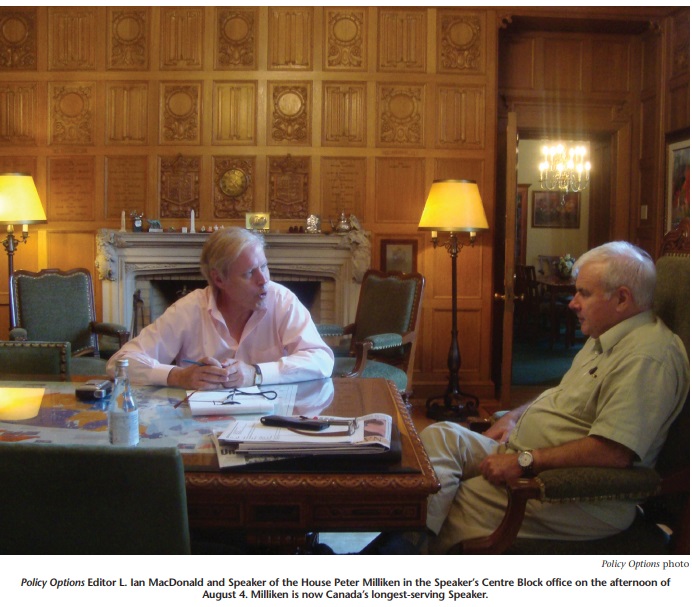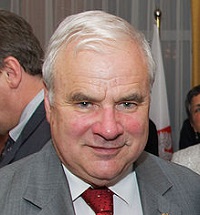
POLICY OPTIONS: Mr. Speaker, thanks for doing this. Our thematic for this month, fixing Parliament, assumes that it is to some extent broken. So what is your sense of it?
SPEAKER OF THE HOUSE PETER MILLIKEN: I don’t think so. Certainly there are arguments it could be changed and made to work better, but that’s not a new argument about the place. In a minority situation I think it is always a little more rowdy and different than it is when there’s a majority.
PO: Which leads to my next question. How much of this is due to the context of a minority House?
PETER MILLIKEN: Well, I think quite a lot because every party is trying to play off against the other to score some advantage in the polls, so you don’t want to appear to cooperate too much. If you can get something done that the other parties don’t like, or at least one of the other parties doesn’t like, you’ve scored some point and maybe made a hit with the public on the issue, and that helps give you a boost in the polls and maybe lower the other party. So these kinds of games go on from time to time.
PO: This is your fourth House as Speaker. The first one was a majoritarian one and the last three have been minority Houses. What is the difference between the two in terms of sitting in that chair?
PETER MILLIKEN: I guess what I would say generally is there are more appeals to the Speaker for decisions on different points because the parties don’t want to make it appear they’ve got an agreement, or that they’re accepting that somebody else is proposing something that maybe is unacceptable to the public and therefore unacceptable to them. So you have more arguments on procedural matters I’d say than perhaps you would in a majority situation, and more motions and proposals for business in the House that you wouldn’t get in a minority situation because you know you could go nowhere with it.
PO: And so how much is due to, systemically, the Westminster model being built for majoritarian outcomes and the House having to adjust to minoritarian ones?
PETER MILLIKEN: I’m not sure that I would argue that it was built for it, but minority governments aren’t all that common in Canada. I mean we’ve had some before, but they’re not something that usually goes on for an extended period of time as they have now for the last three Parliaments, this Parliament and the two before. So it obviously has its impact because when it does happen I think parties tend to use it in ways that they perceive to be to their advantage in terms of electoral outcomes.
PO: Certainly Parliament, if not dysfunctional, seems to be lacking in civility sometimes. Is that true?
PETER MILLIKEN: Yes, that argument is put forward from time to time. I don’t think that it is new but I think there’s — certainly there are moments when people get quite exercised and start yelling at one another. I believe that’s happened in the House before. I don’t think that’s something that’s particularly new.
PO: When I first came here as a high school student with my class in the spring of 1965, which was the time of the Lucien Rivard affair, with John Diefenbaker tormenting Lester Pearson every step of the way, that was no walk in the park.
PETER MILLIKEN: Exactly, and the yelling in the House at the time was quite vigorous, as I recall.
PO: But that was before television arrived in 1977, and the rules have been and remain very strict about television. No cutaways, no reaction shots, but there were no curbs on demeanour either. Was that a seminal event — the arrival of TV?
PETER MILLIKEN: Well, I think TV has affected the House significantly and it has done so over a period of time. And I think it does so because people want to get on the news. It’s one thing to be on CPAC, but it’s another to get on the news, and what seems to attract media coverage of Question Period or debate in the House is the use of insulting language or something that’s fairly offensive. Those are the parts that get played, not what I would call more serious parts of the debate.
PO: So then have the media and the opposition parties of the day, regardless of which of the two major parties is in government, become in a sense co-conspirators in the drive-by shootings that we see in the media?
PETER MILLIKEN: Well, I don’t think it’s just the opposition, I think it’s the government as well. I mean, you want to get on television, you say something that is going to get on the news, usually something fairly offensive, but I think it works both ways. I don’t think it’s a one-sided affair.
PO: So let’s consider some of the functions of Parliament within your oversight and what can be done to improve them, if not fix them. First, Question Period: it’s obviously a central platform of Parliament in terms of the news cycle and yet there are days when it could be called All My Children, with you as the executive producer of the show. What’s your sense of the demeanour and the decorum of Question Period?
It’s one thing to be on CPAC, but it’s another to get on the news, and what seems to attract media coverage of Question Period or debate in the House is the use of insulting language or something that’s fairly offensive. Those are the parts that get played, not what I would call more serious parts of the debate.
PETER MILLIKEN: Well, I reiterate what I said earlier, I think it could be enhanced if media covered intelligent questions and answers. I think that if they played a question and a response that were good once a week or twice a week, Members would compete to get on, and I think that would have a significant effect on the type of question that gets asked and the type of response that’s given. I think that playing to that would become something that Members would want to do, and it would change the temperature a bit in Question Period for sure and possibly the demeanour as well.
PO: Would you think it would be a good improvement if, for example, we adopted the Westminster model where the prime minister was only in the House once a week for Prime Minister’s Question Time? It seems to me, talking to ministerial staff of whoever is in government over the years, an awful lot of time is put in QP preparation for questions that are never asked, not just of the PM but ministers as well.
PETER MILLIKEN: Well, I’m sure that’s true not just for the prime minister but for all ministers. The Westminster model involves much more than the prime minister only being there for half an hour; it involves having certain ministers there at the other times and on other days. It’s something the government, I’m sure, considers from time to time because obviously they’re expending a fair bit of energy. On the other hand, I’m sure there are other ways of doing it that might be more satisfactory from the point of view of the operation of our House, which is operated in a different way. One of those would be to choose which ministers are going to appear, say, the day before. You can have the House leaders or groups of the party, some business committee, decide which ministers are going to be asked to be there and then have those ministers there as a group. You might have more than one, as they have in the UK; you might have four or five who are expected to be there depending on the issues that the opposition parties are going to raise. There are differences in our Question Period. The British House allows a lot of government members to ask questions; ours does not, which obviously changes the tone of things here. The British House also has no applause in their Question Period which makes it a much quieter affair than here…You don’t have these standing ovations and all this stuff.
PO: This is where you read in Hansard: “Some honourable members: ‘Hear, hear!’“ or “Some honourable members: ‘Oh, oh!’“
PETER MILLIKEN: Yes, and it’s usually when it’s just “Hear, hear!” or “Oh, oh!” it’s because they’ve drowned out the person who has the floor and they have to show that there was a break.
PO: Second, Standing Order 31, the famous SO31s, where members get to say whatever they want for 60 seconds without any curbs or limits. It seems to be a forum that would allow an airing of the voices of the nation. Someone turning a hundred or a peewee team winning a national championship or something like that. But too often it seems to be like a cacophony of hyenas. Are there moments when you sit in that chair and think, This is, way over the line?
PETER MILLIKEN: Yes, I’ve ruled some over the line and told Members if that’s the case. They go, in my view, very close to the line or occasionally get over at the very end of their comments. I think that the purpose of it was to allow the Members to express their pleasure in somebody achieving something somewhere in the country. I think that was the idea behind it when it was brought in. And it worked that way for a long time. I think it’s being used a lot for political advertisement now.
PO: Its purpose seems to have been distorted for partisan gain.
PETER MILLIKEN: Yes.
PO: Third, committees: some of them clearly have been turned into star chambers, forums for accusation and invective with no regard for due process or presumption of innocence or reputation. I think both major parties are equally to blame for this, whoever is in power or whoever is in the chair. I could cite the Public Accounts Committee chaired by the Conservatives during the sponsorship scandal, the Ethics Committee chaired by the Liberals during the Schreiber-Mulroney affair, and lately I think it’s the Operations Committee during the Guergis-Jaffer matter. Yet there are other committees that work very well. Does it make a difference if there is a strong chair?
PETER MILLIKEN: I’m not a good person to ask that question because I don’t follow what goes on in committees. I read occasionally about what has happened in the media but that’s about it, because committees are not normally something that comes to me. I don’t sit as a committee chair at all. I have done so in the past and I don’t recall having particular difficulties at that time in the committee that I was chairing, but it was Procedure and House Affairs, which you know it isn’t the most partisan of groups. I’ve read a little about what goes on, but it’s hard for me to explain why it happened, how it happened or who started it.
PO: Is it fair to say that there’s sometimes an absence of collegiality that can be partly attributed to the minoritarian situation?
PETER MILLIKEN: Absolutely, and you know you have situations where the parties want to take advantage of the fact that they can do stuff in committee because they can get other parties voting with them and overrule the government or the chair of the committee, or whatever the case may be, and then take advantage of that. Of course there are appeals to chairs’ rulings unlike those of the Speaker’s. So the chair can make a ruling that is perfectly correct but gets overturned by appeal and thereby forces the committee to do something that his ruling says they couldn’t do and suddenly they are doing it. These things have happened and occasionally you get reports to the House on it, so it is something I deal with in that sense but that’s about it. I don’t always know the reasons why and how it got the way it did. You may have noticed in private members’ business occasionally there will be a bill reported with an amendment, and there’s an argument that the amendment is out of order, it was ruled out of order in the committee; they appealed the chair’s ruling, made the amendment and then I threw it out because the chair was correct in making his ruling.
It’s hard to say who was the best, but they were fun to watch, and I think the message that they conveyed to me is the ability to speak without reading, and it’s something that we are moving away from in part because of television in the House.
PO: How much can the relative weakness of House committees be attributed to a lack of staffing? For example, compared to congressional committees in Washington where there are staff directors, directors of communications, dozens of members of permanent staff of committees, where a parliamentary committee here is lucky to get a clerk who is not shared with another committee.
PETER MILLIKEN: I don’t know. I can’t answer that because I’m not familiar with the work of the committees elsewhere as well. I’ve not been involved with them very often.
It’s not something that as Speaker I have much control over. Certainly the Library of Parliament provides the research and support to the committees as I understand it — it did with the committee that I chaired when I was doing this and I thought the committee members were well briefed when they needed to be and if they had questions they could get information. So I don’t know how to weigh that and I don’t know how much influence the other persons advising these committees in the congressional system have in terms of what questions they feed to the members of the committee and so on. I’m unfamiliar with that.
PO: Your ruling on the Afghan document file has been called a landmark ruling. How much thought went into that and how much work, not only with yourself but the Clerk of the House and your lawyers and your staff?
PETER MILLIKEN: Well, of course the Clerk and the lawyers did the bulk of the work. We had a discussion as usual after hearing the arguments on this report for an extended period on what I thought the ruling should be. They didn’t disagree with what I suggested and I said, Well then, draft something up that backs this up. And that’s what happened. They do the bulk of this work. I don’t pretend to sit around reading procedural books extensively or to look something up myself. On the other hand, I think the arguments on the issue were fairly compelling and I felt comfortable in making them.
PO: It seems to be both rooted in Westminster tradition but equally rooted in the tradition of Canadian compromise or even Solomonic, if you like, in that it affirms the right of Parliament to have these documents but equally the obligation of governments to provide for the security of our troops and not putting them into harm’s way. Is that a fair summary?
PETER MILLIKEN: I think that Parliament has always had the right to insist on production of documents. I stress that had it been a majority Parliament the motion would not have carried, I’m sure, and so we would not have been in this situation, there wouldn’t have been a ruling. But in a minority Parliament there was a majority that voted in favour of production so it’s normal to do that as well. I think it was forgotten in the course of drafting of the motion, and it’s something that is usually negotiated in advance of such a motion being presented to the House if it’s going to be accepted. You see from time to time on notices of motions for the production of papers, there’ll be a caveat offered and then the House agrees to the motion. In this case there was no caveat offered and no discussions apparently, not that I was aware of anyway, and the motion was voted through. So then what do you do to protect national security, because the House doesn’t want to violate national security and put people in peril. I think a compromise has been worked out which appears to be satisfactory to most of the parties. I think it will likely result in the issue being resolved in a way that’s satisfactory; I’m hoping so anyway. It’s obviously going to take some time because of the volume.
PO: You’re now the longest-serving Speaker in Canadian history. We’ve talked, at least I’ve talked, about some of the low moments that we see here in this place. What about some of the highest since you’ve been here? I’m thinking of the Québécois nation resolution in November of 2006, where Mr. Harper crossed the floor to shake hands with Bill Graham, the Aboriginal redress of June 2008 or all members wearing ties and scarves for Jack Layton in empathy with him for his cancer treatments in March of 2010. What are yours? What are the ones that come to mind for you?
PETER MILLIKEN: I’m not good at this. I forget, I guess, moments that are important like that. Certainly having some of the speakers that came to visit…persons who addressed the House, like the President of Mexico. People like that who’ve come and visited the House of Commons that I’ve enjoyed meeting in the course of my work. I remember when Tony Blair came and addressed the House, it was my first one as Speaker. I find that always interesting and fun. You get to meet these people and have a brief chat with them and hear a speech. I think Members have enjoyed that. I certainly have. Obviously within the chamber itself, votes on confidence in various governments have been very interesting, debates sometimes on confidence motions have been quite interesting in the House. How this all plays out has been fun to watch.
PO: Best all-around parliamentarian who is no longer sitting in this place that you’ve seen?
PETER MILLIKEN: Is no longer sitting in this place?
PO: Just to be fair to you.
PETER MILLIKEN: Well, that I’ve seen whenever I’ve been here: well, Mr. Diefenbaker was always very good. I enjoyed watching Mr. Pearson very much. Saw them from time to time back in my student days. John Turner was very good in Parliament. He loved being here and was very good on his feet. Mr. Trudeau, I didn’t see very often, but he was good. Joe Clark, I think, was another parliamentarian who really enjoyed himself in the House. I don’t know, it’s hard to say who was the best, but they were fun to watch, and I think the message that they conveyed to me is the ability to speak without reading, and it’s something that we are moving away from in part because of television in the House. It would be great if more Members were participating in the debate by saying what they think, and hearing the response from other Members and responding to it. I think it makes for more lively debate and more interesting discussion.
PO: You’ve been here since 1988 as a member and as Speaker since 2001, but you’re not standing for election again, as you informed your riding association this summer. Why? Is it time for you to leave this place, to move on? And what do you want to do next?
PETER MILLIKEN: Well, I thought it would be nice to take a break. I find the hours of work very demanding and it’s just hard to get time to do other things. I’m getting very close to retirement age so I thought it would be nice to do something else. What I’ll do I’m not sure. I’m more than happy to spend some time at home and at my cottage. I get very limited time to spend there so I think that’ll be a nice change, and then I can pick and choose the various other items that I’d like to do on a volunteer basis and so on in the community in Kingston. Perhaps some international work, with the former parliamentarians, that sort of thing. I think I’ll find things to do but I’m looking forward to getting more time at home.
PO: There’s a story, and perhaps it’s an urban legend, that you subscribed to Hansard as a student.
PETER MILLIKEN: I did.
PO: And in those days you couldn’t read it online. You had to wait for the mail to come every day.
PETER MILLIKEN: Well, it was great because usually I would get Monday’s Hansard on Wednesday, in the mail, and it was three dollars a session. So it was easy to get and it was delivered on a fairly timely basis. Yes, I still have most of my old copies. They’re not here but they’re in Kingston, and I have them bound up and have them on a shelf.
PO: What will you miss about this place?
PETER MILLIKEN: Oh, working with the Members. The camaraderie with other Members is something that is really enjoyable. You know, you get to discuss all kinds of things and share experiences, travel together, there’s lots of opportunity for mixing and mingling with people from across the country, and in part when you travel the country you get to meet some of their friends and supporters in other areas too, which is always good fun for me.
Photo: Shutterstock











